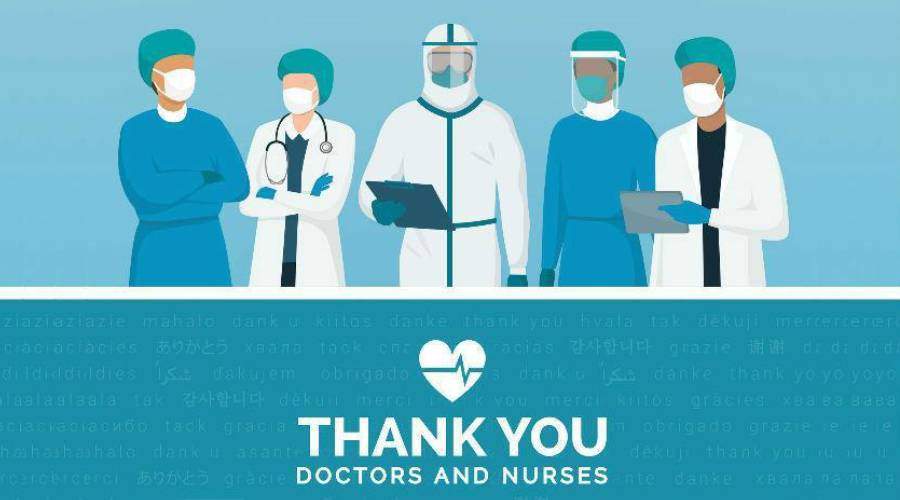How Can Health Care Workers Protect Themselves and their Families?
Public health experts are now balancing the need to keep health care workers on the front lines against the need to protect medical staff from becoming patients themselves; therefore, some of the preventive measures implemented in order to reduce the contagion risk include revaluating and modifying their protocols.
Frontline workers are protected when they first encounter a suspected COVID-19 patient. Surgical masks — which are looser fitting and protect from large droplets, splashes and sprays from sneezes and coughs — are an acceptable alternative form of protection.
Health agencies and organizations also recommend that, in addition to the masks, workers should also wear eye protection, gown, and gloves. Its unbelievably valuable to keep in mind that the protection of your staff and you come first, but there are also other factors that are as important for hospitals that must be considered such as mental health and workers’ families protection.
Health organizations recommend that workers should wear eye protection, gown, and gloves.
Reducing contagion risk in your home
As a health care worker, you are putting your life at risk by stepping up to treat patients with COVID-19. On the other side, there is also the fear of spreading the virus to elderly parents, your kids and an increasingly urgent fear to pick up COVID-19 at home.
We know you want to protect your family, so – even if it is difficult to choose to stop going home– this is the best way of preventing contagion risk.
Renting short term apartments for quarantine is an option now for you and your partners that are on the front lines in the pandemic. This way you have a safe place to stay, you are not worried, and you can protect your families.
There are furnished apartments available in Ottawa and several cities in Canada, that offer all amenities to feel comfortable while away from home. For a feeling of home-away-from-home like, it is also important to stay in touch with your family, and technology is a huge help in this case.
Taking care of your mental health
Feeling under pressure is an experience that you and many of your partners are going through. It is quite normal to be feeling this way in this current situation. Stress and the feelings associated with it are by no means a reflection that could interfere in your job performance or feeling weak.
Stress and the feelings associated is quite normal to be feeling in this current situation.
Taking care of your mental health and psychosocial well-being at this moment is so important as taking care of your physical health. You are not on a speed race. It is a marathon of a lot of resistance that needs permanent self-care during this social distancing.
Here’re some self-care practices you should adopt, according to the World Health Organization (WHO):
1. Taking care of basic needs: Be sure to eat regularly, healthier, and balanced. Drink water to keep yourself hydrated. Avoid sugary drinks and junk food. And sleep at least 8 hours to recover from the working day.
2. Take a break: Whenever possible, engage in fun, relaxing, and comforting activities, such as reading, watching movies, playing board games, or talking about every day and non-pandemic issues. At work, take active breaks as often as possible and avoid alcohol and tobacco.
3. Keep in contact with colleagues and colleagues: Observe, listen, and respect the differences between partners. Some prefer not to talk so much; others feel better encouraged by sharing their experiences. Have constructive conversations that complement the work you do as a team.
If you see a colleague who is at risk of a mental problem from chronic stress, support him/her and immediately alert the team leader.
4. Stay connected with your loved ones: Whenever you can and feel overwhelmed, contact your loved ones through the phone and other virtual methods. Your family and loved ones are your supporters outside the health care system.
If you feel exhausted, with insomnia, poor appetite, prolonged sadness, intrusive thoughts, and hopelessness, ask for help from a colleague or supervisor.
5. Self-observation of emotions and sensations: Watch and observe your emotions and reactions over time. If you have permanent feelings of exhaustion, insomnia, poor appetite, prolonged sadness, intrusive thoughts, and hopelessness, seek help from a colleague or supervisor. It is normal to feel unpleasant emotions at times, it is a sign of defense against danger. Recognize their signs of stress and to attend to them.
6. Create self-help groups: You can create it voluntarily with your colleagues to share your emotions such as frustration, restlessness, lack of control, instability, or overwhelm. The activities are carried out in an atmosphere of trust and confidentiality.
If you are sharing a short-term corporate rental with some colleagues, you can create a group with them, that will be the ideal private place where you can talk about it.
Corporate Stays is a corporate housing company with more than 1200 serviced apartments in all major Canadian cities. You can rent our furnished apartments in , Vancouver, Quebec, and many other cities to feel at home while you’re on the frontline protecting your family and patients.


